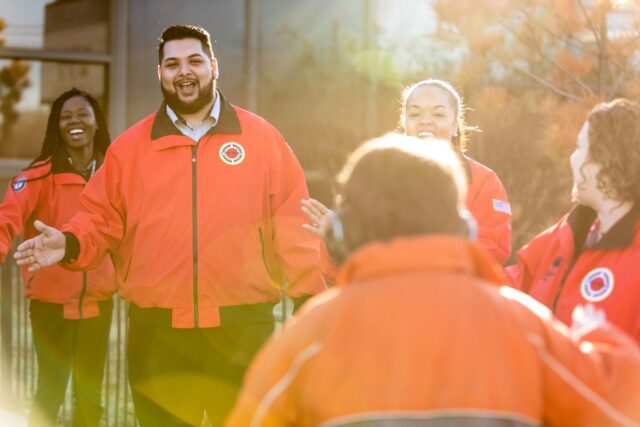What to expect at the start of City Year service
Serving with City Year AmeriCorps
So, you’ve accepted the invitation to serve with City Year in one of 29 amazing U.S. cities. Perhaps, you’ve decided to serve in your hometown. Or maybe, you’ve decided to move across the country and root yourself in a new community. Either way, it’s normal to have questions about what your year with City Year will really look like.
You may even be thinking: What exactly do City Year AmeriCorps members do? What will my day-to-day experience be? What is a student success coach?

It can be hard to answer those questions because just like most things, the experience varies—from person to person, team-to-team, and city-to-city. But here, we try to lay out the basics from my perspective as an alum. I’ve been in your shoes and want to help you transition to a successful, challenging and unforgettable year.
Here’s what you need to know for the start of service:
Basic Training Academy (BTA) at City Year
Basic Training Academy, or BTA, is a month-long “crash course” introduction to City Year service. It’s an onboarding experience that all AmeriCorps members must attend in preparation for the school year. In BTA, you’ll learn about the history and evolution of City Year as an organization; youth development strategies; our in-school service model; and our commitment to diversity, equity and inclusion.
You’ll be introduced to City Year’s unique culture and values that have been developed over three decades, especially our fundamental belief in the power of young people to effect positive change—our belief in you and your team. Not sure what a PITW is or what LACY stand for? (Hint: Life After City Year.) No problem—you’ll be using these phrases, and many more tools and techniques, in no time.
AmeriCorps members also receive their team and school assignments during BTA. So, in addition to learning about the work, BTA is where you begin building strong relationships within the City Year community. Taking the time to get to know your fellow AmeriCorps members and City Year site staff is important—these connections and support systems will help sustain you through the ups and downs of service.
“We got great training in BTA and spent a lot of time talking about the systematic issues that affect the students’ lives and the communities they live in,” says alum Kristina Stamm, City Year Milwaukee ’20. “We discussed how those issues transfer into the school environment and how to center our service with those things in mind.”
Starting in school service
Now that you’ve completed your initial training, it’s time for you to start in-school service. This part of your experience can be simultaneously overwhelming and exciting—and it’s important to make room for both of those feelings.
Here are a few things you can expect during your first few weeks in your new school community:
Long service days
Your days will be long and full. Some days will fun, others will be frustrating. Never doubt, however, that you are having an impact.
Corps members start their day before students arrive and end their day after students have gone home. Your day might begin at 7 am and end at 5 pm. You’ll be in schools four days a week and be in training with your teammates for the fifth day—getting additional training and support so you can be successful and find ways to take care of yourself.
These hours will take some getting used to, for sure. But the foundation you’ll be building with your team and new school community will be rewarding!
Building community and relationships
This part of service is all about building relationships—with your team, students, teachers and the rest of the school community. With your team, you’ll start to learn everyone’s strengths, personalities and working styles. You’ll quickly figure out which one of your teammates is a math wiz or which one is incredibly good at organizing afterschool programs—and you’ll learn to lean on them when you’re having a particularly challenging day.
Most importantly, though, you’ll begin to build trusting relationships with your students. This may seem daunting, but it all stems from actively showing a genuine interest in the lives of your students. Ask them what they love to do outside of school, about their favorite book or their family.
These questions may seem simple but over time they’ll lead to deeper conversations and connections. As long as you keep showing up for your students day after day with care and empathy, your relationships with them will blossom.
Supporting student academic growth
Of course, you’re also there to help students achieve their full academic potential as a full-time student success coach.
We know that a student’s academic success is tied to their social-emotional well-being. So, this is where the relationships you’ve started to build with them will help. Maybe one of your baseball-loving students needs some motivation in math class. Why not ask them about their favorite player’s batting averages? Is your visual learner struggling to find joy in literature? If possible, take them to the school library and help them find a graphic novel that interests them.
Actions like these not only motivate students but they let students know they are safe and cared for and they help them to find joy in their schoolwork.
Centering your own mental health and well-being
The beginning of service is a big adjustment for corps members. And while the work is new and exciting, I can well remember how it can be physically and emotionally exhausting at times. As you are laying the foundation for your work in schools and being of service to others, it’s essential to build a solid self-care plan.
Of course, this looks different for each person. Self-care could mean logging off social media for the weekend or deciding to stay in instead of hanging out with teammates on the weekend. Your self-care plan is an essential part of staying healthy throughout service. It is also a way to ensure that your “best self” shows up in the classroom.
“Everyone should have a self-care plan. Actively schedule days off and build in time to do hobbies you love or activities you know help relieve stress. And don’t just say, have a plan in your head; write it out. You should have it in writing because when you’re in those moments when you’re feeling stressed, when you’re feeling overwhelmed, those things don’t come to your mind.”
– Elizabeth Stanford, licensed professional counselor working in Kansas City schools.
Celebrating your own growth
Any City Year alum—and there are more than 35,000 of us right now—will tell you that their year or two of service was one of the most difficult of their lives. But many of us will also tell you it was one of the most worthwhile.
You will change and grow throughout your service experience. You will learn as much from your teammates as from your students. You will understand issues like educational equity in a much deeper, more personal way.
You will gain skills that will help you define who you want to be in the future and how you want to show up in your community and your workplace.
Celebrate every step forward and be gentle with yourself when you inevitably hit a setback. Know that your team has your back and that your future, and the future of your students, is brighter because you chose to serve.
Looking forward to starting your City Year journey? Click below to learn more:

Related stories
Because you'll be living on a stipend, it might be a good idea to hold off on that ottoman from...
Read more about Furnishing your apartment on a budget: Tips for AmeriCorps membersCity Year’s “Why We Matter” podcast explores the vital role of education and mentorship in empowering young people. Through interviews...
Read more about Why City Year’s student success coach network mattersRead more and check the City Year blog to learn the soft skills our corps members gain through a year...
Read more about Top five skills employers want you to have todayIf you speak with an alum of an historically Black college or university (HBCU) about their experience, you’ll quickly learn...
Read more about Serving with City Year sharpens job skills, HBCU graduate says















